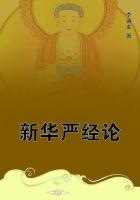The social influence does not supersede the necessity for individual genius.Everything that is done must of course be done by individuals.The 'spirit of the age'must mean such a social order as fosters discovery;an order,for example,in which so many men are devoted to scientific inquiry that discovery becomes certain.The man of genius is still first in the race;but he is first of many competitors,who,even if he were to die,would achieve the same result a little later.The individual is still required,but the importance of any particular individual is so far diminished.The growth of science cannot be explained,in the historical sense,without reference to the social order which leads to the cultivation of science.It is not something which grows of its own accord outside of society,but supposes the whole social structure and the moral factor which we are endeavouring to discard.
The difficulty affects Buckle's mode of dealing with the great historical problems.Since progress depends absolutely upon the growth of science,the one essential is the spirit of inquiry,or,as he calls it,'scepticism.'Its natural antagonist is the 'protective'spirit,which implies servile submission to authority in matters of opinion or practice.The disastrous effects of such a spirit are traced in Spain and Scotland.The 'inquisition'and the tyranny of Puritan ministers are its natural fruits.No one,of course,will deny the evils due to a suppression of intellectual activity.To exhibit and to denounce those evils is a task which Buckle performs with admirable vigour.But,so far,he is merely writing an effective pamphlet on a large scale.He is denouncing the protective spirit as the Whig historian denounces Toryism,or rival religious historians find the evil principle in Protestantism or Popery.The protective spirit is an abstraction which means a quality of the whole society considered from one point of view;its relation,namely,to scientific progress.It cannot be an ultimate cause of power in itself --but is a product of many complex conditions.
To consider it impartially,to form an accurate diagnosis of the disease is the problem for the scientific historian.He should discover the uniform laws whose working is manifest in the morbid condition,and,in the case of Spain,render the intellectual paralysis permanent and incurable.Here Buckle's method becomes that of the ordinary historian.He refers to the earthquakes and various physical conditions which apply to the case of Spanish superstition.We now learn,however,that these physical influences are 'interwoven with a long chain of other and still more influential events,'which enable us to trace the steps of decline with 'unerring certainty.'(48)We go back,therefore,both in Spain and Scotland to the political history;to the play of party and class-interests,which have forced a priesthood at one time to ally itself with despots,and at another to throw itself upon the people.The history may be accurate and the facts alleged are no doubt relevant;but they leave the difficult problems unsolved.Why,for example,was the Spanish people at the head of European races in the sixteenth century,and why did it then suddenly sink into decay?Why did Scotland,sunk in superstition in the seventeenth century,become,though still the most superstitious country in Europe,the most energetic and progressive part of the British empire?To attack such problems it would,I take it,be necessary to study impartially a vast variety of social and of what Buckle calls moral questions;to give weight to a number of 'interwoven'causes,determining the history of the two races.The facts --the intellectual stagnation of Spain and the intolerance of Scottish Puritanism --imply,as Buckle urges,some general causes.The history shows them at work,and Buckle's survey brings out many significant facts.Still,when the protective spirit is hypostatised and made a kind of independent cause,determining and not determined by the general social state,we miss the most interesting problem,or take the solution for granted.What,after all,is the true secret of this mysterious power?Whence came its vitality?The evil principle appears like the supernatural sovereign in 'Philip Beauchamp'or the Demogorgon of Shelley's Prometheus,a cruel tyrant enforcing false belief --even so,he requires to be explained as well as denounced,and we are at least tempted to ask whether the church and the king must not have discharged some useful social function;and the creed have embodied some element of thought and emotion congenial to human nature.That is the aspect neglected by Buckle.















